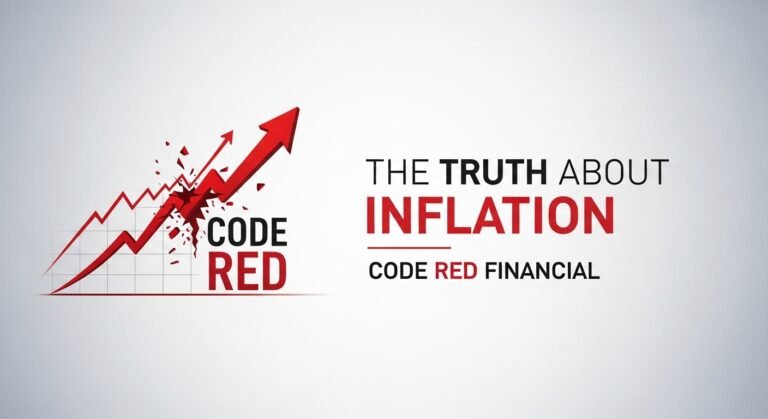
It’s Time to Shatter the Cycle of Poverty & Thrive
I often find myself reflecting on the currents shaping our society – from the intricacies of the stock market and broad economic trends to the everyday challenges of personal budgeting. It’s a practice I undertake before sitting down to write for you here at Code Red Financial. Recently, after an hour or so of contemplating various topics, one persistent thought kept percolating to the surface: the insidious, perpetual cycle of poverty that can afflict families, generation after generation. For those that know me, know one thing, I like anecdotes and parables and one of my favorites is the parable of sowing seeds.
“Breaking the cycle of Poverty.” It’s a powerful phrase, and one that brings to mind the work of Oscar Lewis, the famed anthropologist credited with coining the term “The Culture of Poverty.” I remember encountering this theory in college and being fascinated by its apparent simplicity and, from certain angles, its factual accuracy when observing societal patterns. Lewis, particularly in works like “Five Families: Mexican Case Studies in the Culture of Poverty,” argued that poverty isn’t just about a lack of resources; it’s a subculture with its own set of values and behaviors, passed down through families, which can make escaping poverty incredibly difficult.
Now, I know what some of you might be thinking. The “Culture of Poverty” theory has its fair share of detractors. As many sociologists and social critics have pointed out since its popularization, it can risk oversimplifying a complex reality and, in some instances, perhaps even inadvertently “blame the victim” by focusing on internal characteristics rather than external systemic barriers. These are valid points to consider. However, a core tenet of Lewis’s assertion has always gripped my attention: the notion that the cycle of poverty often persists because crucial skills, mindsets, and knowledge – be they financial, intellectual, or otherwise – aren’t effectively learned or passed from one generation to the next. This creates a vacuum where limiting beliefs and less-than-ideal habits can unfortunately take root and be inherited.
One of the primary goals for starting Code Red Financial was never just to provide budgeting tips or teach you how to merely survive. Heck, there are enough blogs out there already doing just that. My primary goal was, and will always be, to show you how to not just save and survive, but how to thrive beyond what you even thought possible and arming you with the tools and the mindset to break free from any “culture of poverty,” perceived or real, that might be holding you back.
So, what did Oscar Lewis actually mean? The culture of poverty concept, in social theory, asserts that the values of people experiencing poverty play a significant role in perpetuating their impoverished condition, sustaining a cycle of poverty across generations. But is that entirely accurate? As with almost any theory, some assertions aren’t fully supported or embraced by all experts. However, the part of Oscar Lewis’s assertion that truly resonated with my own experiences and observations is this idea of generational transmission – or lack thereof. The notion of just how one generation, perhaps unknowingly, might pass on values, habits, or a limited worldview that inadvertently sets up the next generation for a similar struggle.
I saw a reflection of this, in a way, in my own life. When I first moved to the United States, my mother, who is an absolute hard worker and someone I admire immensely, only envisioned me working in what might be considered a “mediocre” job. Now, I say this not to degrade any role in society – all honest work has dignity. My point is that her vision for me was framed by her own experiences. My aptitude for math and science was well above average, and my capacity to comprehend complex subjects was strong. But how was she supposed to fully grasp or guide that potential if her entire life had been a testament to a different kind of work, a different set of expectations? How could she champion a path she’d never seen, accustomed perhaps to, as I metaphorically put it, “pillaging for the crumbs left over from the pristine table of society”? Her dreams for me were born from love but shaped by her reality.
The mission here is not to assign blame; but understanding and recognizing that the “software” we run on – our beliefs, our habits, our understanding of what’s possible – is often programmed by our upbringing and environment. And if that programming is limiting, it’s up to us to debug and rewrite the code. A question, I have always like to ask myself is ” How can we expect a person who has never fished to competently teach another to”?
Let’s delve a bit deeper into Lewis’s theory, not to get stuck in academic debate, but to extract insights that can help us chart a course for “Breaking the Cycle of Poverty” and building a legacy of financial strength and abundance.

Unpacking the “Culture of Poverty”: More Than Just Lack of Money?
Oscar Lewis, through his ethnographic studies, such as those detailed in “La Vida: A Puerto Rican Family in the Culture of Poverty—San Juan and New York,” identified several key characteristics he believed defined this “culture of poverty.” These weren’t meant to be character flaws, but rather adaptations to the harsh realities of persistent deprivation. Some of these included:
- Present-Time Orientation: A focus on surviving the immediate day or week, making long-term planning seem like a luxury or even an impossibility. When you don’t know where your next meal is coming from, saving for retirement feels like a distant dream.
- Feelings of Marginalization and Helplessness: A sense that society’s institutions aren’t there to help you, that you’re an outsider, and that you have little control over your future. This can lead to cynicism and a reluctance to engage with systems that seem designed to keep you out.
- Weak Ego Structure and Lack of Impulse Control: This is a more controversial aspect, but Lewis suggested that the constant struggle could impact self-esteem and the ability to delay gratification.
- Different Family Structures: Sometimes characterized by female-centered households or more informal family units, often as adaptive responses to economic instability.
- A Sense of Resignation or Fatalism: A belief that escaping poverty is highly unlikely, regardless of effort.
Lewis theorized that by the age of six or seven, children in these environments would have internalized these values, making it difficult for them to seize opportunities later in life, even if those opportunities arose.
Now, looking at this list, it’s easy to see why the theory is contentious. It can feel like it paints a bleak, deterministic picture. However, if we step back from judgment and look for the underlying mechanisms that might lead to these outcomes (rather than inherent “traits”), we can find valuable clues for intervention. Many contemporary sociologists, while critical of the term “culture of poverty” itself, do acknowledge that persistent, multi-generational poverty can shape behaviors and outlooks that are challenging to overcome without significant individual and structural changes.
For instance, a “present-time orientation” isn’t necessarily a cultural failing; it can be a perfectly rational response to chronic instability. If your experience teaches you that the future is uncertain and resources are scarce, focusing on immediate needs is a survival strategy. The challenge arises when this survival strategy becomes so ingrained that it prevents you from shifting gears when opportunities for long-term advancement do appear.
Similarly, “feelings of helplessness” can be a direct result of encountering systemic barriers, discrimination, or a lack of access to quality education and employment. It’s not an inherent personality trait but a learned response to an environment that offers little hope or agency.
The part that I believe holds significant weight, and that ties back to my own mother’s experience, is the intergenerational transmission of expectations and financial know-how. If a family has only ever known struggle, how can they realistically teach the next generation the mindset, strategies, and specific financial skills needed to build wealth or navigate complex financial systems? They can pass on love, resilience, and a strong work ethic (as my mother did in her own way), but the roadmap to a different financial destination might be missing because they never had a copy themselves.

Rewriting Your Financial Code: The Code Red Blueprint for Breaking Free
So, how do we move from understanding these potential dynamics to actively breaking the cycle? This is where Code Red Financial steps in, with actionable strategies and avoiding the limits of just the theoretical and the despair of dwelling on the past for you to create a brighter future
- Mindset Makeover: From Scarcity to Abundance This is the absolute foundation. If you believe, deep down, that you’re destined for a life of financial struggle, or that “people like us” don’t get wealthy, you’ll unconsciously sabotage any efforts to the contrary. Now, I’m not a particularly religious person myself, but I find that some ancient stories, regardless of their origin, pack a powerful punch when it comes to understanding human nature and the challenges we face. One of my favorites, and one I believe is incredibly relevant here, is the Parable of the Sower, which I alluded to earlier. As the story goes (you can find a version in Matthew 13:18-23), Jesus told a parable about a farmer who planted seeds in four different types of soil.
- Some seeds fell along the path, and the birds came and ate them up.
- Some fell on rocky places, where they did not have much soil. They sprang up quickly, because the soil was shallow. But when the sun came up, the plants were scorched, and they withered because they had no root.
- Other seeds fell among thorns, which grew up and choked the plants.
- Still other seeds fell on good soil, where they produced a crop—a hundred, sixty or thirty times what was sown. Jesus explained that the soils represented people’s hearts or their receptiveness, and when the message (in that context, the word of God) is planted in a good heart, good things will be produced in that person’s life.
- The ‘seeds’ can be anything: a piece of financial advice, an educational opportunity, a new job prospect, a supportive mentor, or even the very articles and tools we share here at Code Red Financial.
- The ‘soil’ represents the mindset, the environment, the preparedness, and the deeply ingrained beliefs within an individual or even a family unit that has known generations of hardship.
- Challenge Limiting Beliefs: Identify the negative financial narratives you inherited or developed. Were you told “money is the root of all evil,” “rich people are greedy,” or “it takes money to make money (and we don’t have any)”? Actively question and reframe these.
- Cultivate a Growth Mindset: Embrace the idea that your financial intelligence and circumstances are not fixed. As Stanford psychologist Carol S. Dweck outlines in her influential work “Mindset: The New Psychology of Success,” individuals with a growth mindset believe their abilities can be developed through dedication and hard work. This view creates a love of learning and a resilience essential for achieving goals, including financial ones. My own journey from a background where higher financial aspirations weren’t readily envisioned is a testament to this.
- Visualize Your Success: Don’t just dream of “not being poor.” Create a vivid picture of what financial thriving looks like for you. What does it feel like? What does it allow you to do for yourself and your loved ones?
- Practice Gratitude and Positive Affirmations: Shift your focus from what you lack to what you have and affirm your ability to achieve more. Statements like “I am capable of building wealth,” “I am a smart money manager,” can, over time, rewire your thinking.
- Skill Up: Acquiring the Tools for Financial Ascent Mindset is crucial, but it needs to be paired with practical skills. This is where we counter that lack of transmitted knowledge.
- Become Fluent in Financial Literacy: This is non-negotiable. Numerous studies from organizations dedicated to financial well-being, such as the National Endowment for Financial Education (NEFE), consistently show a strong correlation between financial literacy and improved financial outcomes.
- Budgeting for Abundance, Not Just Survival: Yes, know where your money is going. But create a budget that also allocates funds towards your future goals – saving, investing, debt reduction – not just covering immediate bills.
- Mastering Savings: Learn the “pay yourself first” principle. Automate your savings, even if it’s a small amount to start. Understand the power of compounding.
- Conquering Debt: Not all debt is bad, but high-interest consumer debt is a wealth killer. Develop a strategy to eliminate it systematically.
- Demystifying Investing: You don’t need to be a Wall Street guru to start investing. Learn the basics of stocks, bonds, mutual funds, and retirement accounts. The earlier you start, the better.
- Building and Protecting Your Credit: Understand how credit scores work and how they impact your financial life.
- Embrace Lifelong Learning and Skill Development: The world is constantly changing. What got one generation by might not be enough for the next.
- Formal Education/Vocational Training: If opportunities for further education or specialized training arise that can significantly boost your earning potential, explore them.
- Read Voraciously: Books on personal finance, investing, business, and personal development are invaluable, as well as online resources like Code Red Financial.
- Seek Out New Skills: In today’s economy, digital literacy, communication skills, and problem-solving abilities are highly valued.
- Become Fluent in Financial Literacy: This is non-negotiable. Numerous studies from organizations dedicated to financial well-being, such as the National Endowment for Financial Education (NEFE), consistently show a strong correlation between financial literacy and improved financial outcomes.
- Strategic Action: The Engine of Change Belief and knowledge are potent, but they only create change when coupled with consistent action.
- Set Clear, Achievable Financial Goals: “Get rich” isn’t a goal; it’s a wish. “Save $500 for an emergency fund in 3 months” or “Pay off X credit card in 12 months” are actionable goals.
- Create a Concrete Plan: How will you achieve those goals? Break them down into monthly, weekly, and even daily steps.
- Track Your Progress: This keeps you motivated and allows you to make adjustments as needed. There are plenty of apps and tools for this, or a simple spreadsheet can work wonders.
- Build an Emergency Fund: This is your shield against life’s unexpected curveballs, preventing a minor setback from derailing your entire financial plan and forcing you back into that “present-time orientation.” Aim for 3-6 months of essential living expenses.
- Seek Mentorship and Positive Networks: Surround yourself with people who are financially responsible and have achieved the kind of success you aspire to. A good mentor can provide guidance, accountability, and help you avoid common pitfalls. This is about consciously choosing influences that uplift you.
- Breaking Intergenerational Patterns – For Yourself and Future Generations This is where you become the architect of a new legacy.
- Open Conversations About Money: If money was a taboo or stressful topic in your family, change that. Talk to your partner, and eventually your children, about money in a healthy, age-appropriate way.
- Teach by Example: Your children will learn more from what you do than what you say. Let them see you budgeting, saving, investing, and making thoughtful financial decisions.
- Provide Financial Education Early: Introduce basic concepts of saving, spending, and giving to children from a young age. As they grow, teach them about banking, credit, and investing. You are actively passing on the skills that may have been missing.
- Establish Generational Wealth Building Strategies: This might seem advanced, but simple things like starting a savings account for a child or eventually considering things like life insurance or small investments in their name, can plant seeds for the future.

Beyond the “Crumbs”: Claiming Your Seat at the Table
It’s true that systemic issues – economic inequality, lack of access to quality education or healthcare in some areas, discriminatory practices – can make the climb out of poverty steeper for some than for others. Acknowledging the “pristine table of society” and the reality that not everyone starts with the same proximity to it is important. My mother’s experience, and the limited scope of what she could initially envision for me, was partly shaped by these larger societal structures.
While we, as individuals, work to improve our own circumstances and advocate for a fairer system for everyone, we cannot wait for the system to become perfect before we take control of our own financial lives. The strategies we’ve discussed are about empowering you, right now, within the current reality, to build a better financial future. The ability to move from hoping for crumbs to confidently preparing creating a path to earn your own feast.
The Journey to Thriving Starts Now
Oscar Lewis’s “Culture of Poverty” theory, for all its debate, nudges us to consider the powerful influence of our environment and learned behaviors. But here’s the empowering truth: learned behaviors can be unlearned, and new, more empowering ones can be cultivated.
Breaking the cycle of poverty is much more than accumulating more money. It represents a fundamental shift with the relationship with money, your beliefs about what’s possible, and the legacy you create for those who come after you. Psychologically shifting from a mindset of mere survival to one focused on cultivating positive seeds that can bear the required fruits for thriving.
This journey isn’t always easy. It requires courage, discipline, and a willingness to step outside your comfort zone. But it is absolutely possible. You have the capacity to rewrite your financial story and build a life of abundance, security, and freedom.
Here at Code Red Financial, I’m committed to providing you with the knowledge, tools, and encouragement you need every step of the way. The cycle can be broken. Your new chapter starts with the very next decision you make.
What’s one limiting belief about money you’re ready to challenge today? Share your thoughts in the comments below – let’s support each other on this journey to thriving!
Disclaimer: This article is for informational purposes only and should not be considered financial or investment advice. Investing in any of the mentioned passive income streams involves risk, and you could lose money. Before making any investment decisions, it is essential to conduct your own thorough research and consider consulting with a qualified financial advisor who can assess your individual financial situation, risk tolerance, and goals. The potential returns discussed are illustrative and not guaranteed. Market conditions, regulations, and other factors can significantly impact the performance of any investment or business venture.






